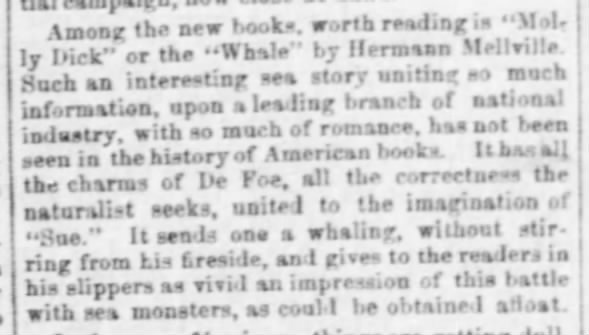Guest post by John M. J. Gretchko
A One-footed or One-legged American God
Herman Melville explored the mythologies of many nations, from India to Egypt to classical Greece and Rome. Would he have ignored North American mythology? Chapter 36 “The Quarter-deck” of Moby-Dick suggests he may have significantly dabbled in it.
Melville writes of Ahab:
“Did you fixedly gaze, too, upon that ribbed and dented brow; there also, you would see still stranger foot-prints--the foot-prints of his one unsleeping ever-pacing thought”
True, these metaphorical footprints on Ahab's forehead are not real---or are they? In the ancient lore of North Americans, footprints, appearing on the bodies of figures, symbolized the invisible presence of Tezcatlipoca, the chief god of the Toltecs or the Aztecs (Séjourné,
Burning Water pages 174-6). This was the Lord of the Smoking Mirror, often depicted with one good leg and with the other missing a foot or a leg bitten off above the knee by Cipactli, the Aztec sea monster.
Cipactli was a crocodile, or according to the
American Researches of Alexander von Humboldt, a whale with a horn in his forehead (
Volume 1 page 338). Cipactli was tempted to the surface when the god used his foot as bait (Burland and Forman,
Feathered Serpent and Smoking Mirror page 55). Tezcatlipoca in place of his torn appendage bore a mirror. Would the medallion-shaped tablet on the upper part of Ahab’s ivory leg be comparable?
The grandiose work,
Antiquities of Mexico (1831-48) by Lord Kingsborough in nine monstrous volumes, each a labor to lift, holds drawings of this one-footed god from the Codex Fejérváry-Mayer, shown with an amputated right foot or leg.
The Literary World of 7 April 1849 discloses that the Astor Library had acquired all nine volumes. Unfortunately Tezcatlipoca is not so identified in the text of
Antiquities, nor do these volumes tell his story.
Today, images of Kingsborough's facsimile Codex Fejérváry-Mayer are accessible via
The British Museumhttps://www.britishmuseum.org/collection/object/E_Am1902-0111-1 is accessible
The manuscript Codex is held by the
World Museum Liverpool.
Although the name of the god is certainly not a household word, it was not unfamiliar in Melville’s day, having appeared as early as the sixteenth century in José de Acosta’s writings, later translated by Samuel Purchas.
Comical wordplay involving the Captain's performance of a "feat" on foot occurs later in
The Quarter-Deck when Stubb whispers punningly “that Ahab must have summoned them there for the purpose of witnessing a pedestrian feat.” As overheard by Ishmael, Stubb makes an awfully good pun in reference to Ahab’s pacing on deck.
In
chapter 19 The Prophet, Elijah calls Ahab "Old Thunder." In the "Quarter-Deck" chapter, Ahab “looked not unlike the weather horizon when a storm is coming up” (
Northwestern-Newberry Edition page 161). In chapter 119, “The Candles,” Starbuck, amidst the thunder and lightning of an approaching typhoon and in “profound darkness,” hears a voice by his side and asks “Who’s there?” Ahab replies “Old Thunder” (
Northwestern-Newberry Edition page 505). Apparently, Ahab speaks of himself. Then in chapter 124, “The Needle,” Ahab notices that his compasses are misreading: “I have it! It has happened before. Mr. Starbuck, last night’s thunder turned our compasses—that’s all” (N-N page 517). Here when Ahab says “thunder,” he means “lightning.” But this was accepted usage. Both Webster’s
1841 American Dictionary and John Ogilvie’s
Comprehensive English Dictionary (London, 1864) in second definitions state:
“Thunder is used for lightning, or for a thunder-bolt, either originally through ignorance, or by way of metaphor, or because the lightning and thunder are closely united.”
Figuratively speaking, is Ahab thunder or lightning or both?
Back in
chapter 36, with a storm approaching, Ahab warns, “Stand up amid the general hurricane, thy one tost sapling cannot, Starbuck” (N-N page 164). Is Ahab alluding also to himself, as a metaphoric hurricane? Could the image of one sapling metaphorically represent or suggest a leg?
Tezcatlipoca is a first rate atmospheric god and rules all weather conditions, as the popular writer Lewis Spence observed one hundred years ago in
The Gods of Mexico, pages 113 and 115. Others have noted that Tezcatlipoca resembles and may be identical with the Mesoamerican Mayan god, Huracan (Guilhem Olivier,
Mockeries and Metamorphoses page 106). In Melville's century lexicographers derived the word
hurricane "from the Indian word
hurica, which signifies the devil."
"both one-legged and a causer of hurricanes."
According to Hunt and others, the Mayan name Hurakan literally means "one-legged."
Did Melville fashion the "ungodly, god-like" Ahab with Tezcatlipoca in mind?

Works Cited
Burland, C. A. and Werner Forman. Feathered Serpent and Smoking Mirror. New York: Putnam, 1975.
Humboldt, Alexander von. Researches Concerning the Institutions and Monuments of the Ancient Inhabitants of America. Trans. Helen Maria Williams. 2 vols. London, 1814.
Kingsborough, Edward King, Viscount. Antiquities of Mexico: comprising fac-similes of ancient Mexican paintings and hieroglyphics. 9 vols. London, 1833-48.
Melville, Herman. Moby-Dick; or, the Whale. Edited by Harrison Hayford, Hershel Parker, and G. Thomas Tanselle. Volume 6 of The Writings of Herman Melville. Evanston and Chicago: Northwestern University Press and The Newberry Library, 1988.
Olivier, Guilhem. Mockeries and Metamorphoses of an Aztec God:Tezcatlipoca, “Lord of the Smoking Mirror.” Trans. Michel Besson. Boulder: U P of Colorado, 2008.
Séjorné, Laurette. Burning Water: Thought and Religion in Mexico. Translated by Irene Nicholson. Berkeley: Shambala, 1976.
Spence, Lewis. The Gods of Mexico. London: Unwin, 1923.
Tedlock, Dennis, translator and commentator. Popul Vuh: The Mayan Book of the Dawn of Life. Revised edition. New York: Touchstone, 1996.





